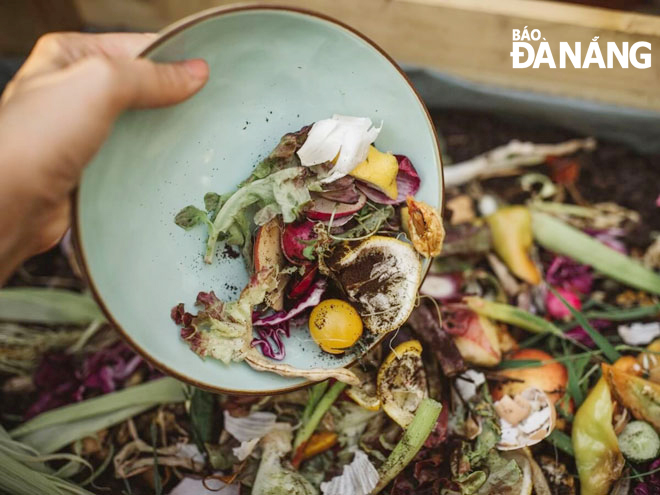Turning composed food waste scraps into compost for trees
Discarded food generating methane is responsible for a large proportion of greenhouse gas, contributing to current rapid climate change. Therefore, using kitchen waste as organic fertilizers for plants properly and effectively instead of pesticides and chemical fertilizers will contribute significantly to reducing a large amount of waste into the environment.
 |
| Student Tran Truong Hoang Vy introduced fertilizer made by the organic waste treatment system researched and applied by her group. |
Effective solution for plants
Ms Nguyen Thi Mai, residing in Hai Chau District spends a lot of time tending, pruning branches and fertilizing with homemade organic fertilizer from kitchen waste to keep her small garden on the terrace always green and full of flowers.
She has mixed the soil with rice bran, soybeans, fertilized with fermented water from vegetables, fruit peels, rice water, water used to wash fish and prevented diseases for plants with alcohol-soaked tobacco and chilli garlic juice.
She put discarded food in the container, then adds water, EM or Imo probiotics to ferment quickly and avoid odours.
After 3 days of fermentation, she filters the water to water plants and then buries the remains in the soil for it to decompose. As the result, her garden is always green and sources vegetables for family meals.
On the YouTube channel of Mr. Phan Minh Tuan, residing in Thac Gian Ward, Thanh Khe District, he often shares how to make fertilizer from food waste scraps.
He usually takes advantage of discarded fish’s head, belly, scales, and bones to combined with molasses, pineapple peels, EMZEO probiotics mixed with water to make fish protein, helping to strengthen the plant’s immune system, improve soil quality, stimulate flowering and fruit production without causing any harms to the environment.
In addition to using the fertilizer made from fish protein, Mr Tuan also uses other natural sources of calcium such as eggshells, beer, leftovers or potassium and phosphorus from kitchen ashes.
Although kitchen ash provides relatively numerous minerals for plants, it should not be overused due to the high alkalinity in kitchen ash, which can reduce the reproduction and development of worms, animals that are beneficial to plants.
In the same vein, Ms Nguyen Thi My, residing in An Hai Dong Ward, Son Tra District, makes probiotics from rice water to water plants. She pours rice water into a glass jar and covers it with a thin cloth or tissue.
After 5-7 days, she filters precipitated rice water to take the clear water, then mixes it with unsweetened milk and collects the product after 1 week of fermentation.
After that, she uses about 1 litre of this product to mix with 1kg of sugar and 10 litres of water, incubates for another 15-30 days and then used it to water the plants.
According to Ms My, the effect of probiotics made from rice water is to improve soil quality and help increase disease resistance for plants.
 |
| Loads of households in Da Nang are using food waste to make fertilizer for plants. Photo: HUYNH LE |
Fertilizers made from kitchen waste need to be used properly
A group of research students from the University of Technical and Education (UTE) - the University of Danang (UD) has successfully made an organic waste treatment system according to Vessel technology with model T-COM V2.0.
Student Tran Truong Hoang Vy, leader of the goup, said that domestic waste has a large organic content so it is easily decomposed anaerobically and generates a number of toxic substances, causing unpleasant odors such as mercaptan, methane.
Therefore, in order to limit waste into the environment, and at the same time take advantage of bio-organic fertilizers from kitchen waste, the group has used closed containers to compost in the direction of making the most of the growth of beneficial microorganisms, creating useful bio-fertilizer products for plants.The small and compact system is designed to handle more than 10kg of kitchen waste per day, causing no odour and is suitable for installation in households.
According to the Da nang Plant Protection and Cultivation Sub-Department, kitchen waste scrabs can be completely processed into nutrients for plants. In particular, some foods can be applied directly such as chopped banana peels.
Eggshells, chicken bones, pork bones, duck bones provide a source of organic phosphorus, natural calcium for plants so people can dry, burn and grind these wastes into powder and then fertilize for plants.
Families can collect an abundant source of kitchen waste to put in a compost bin with bone powder, coffee grounds, tea grounds, fruit peels, then supplement probiotics into the mixture and use after 1 week of incubation.
As shared by Dr Pham Phu Song Toan, lecturer at the Faculty of Environmental Engineering Technology, the UTE-UD, the trend of using kitchen waste as fertilizer should be encouraged and replicated because it is quite easy and economical.
All in all, waste from the kitchen will ensure an adequate source of nutrients for plants, not cause odours if properly used, avoid releasing a large amount of waste into the environment and help slow down climate change.
Reporting by HUYNH LE- Translating by T.VY